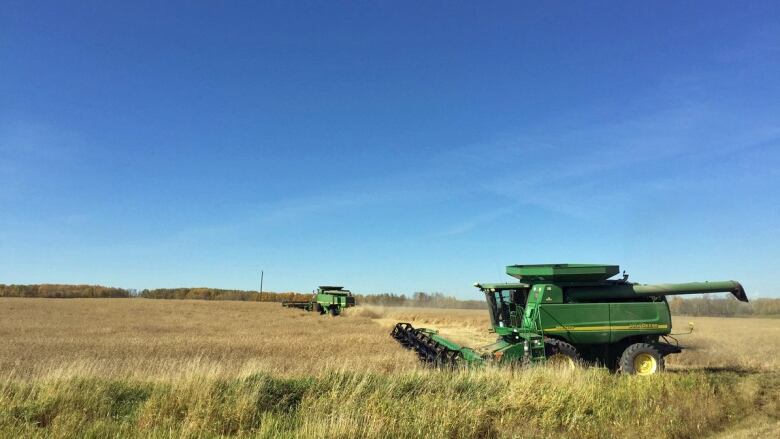Carbon pricing could take money from Manitoba farmers, industry group says
Costs of a price on carbon could be passed on to producers when they buy fuel or fertilizer

Manitoba's agricultural industry is one of the province's big emitters, and talk of a price on carbon emissions has producers worried it could take money right out of their pocketbooks.
"We have a choice right now," said Dan Mazier, president of Keystone Agricultural Producers (KAP). "The choice would be a scheme that would allow farmers to be part of the solution or be part of the problem."
- Pallister rules out cap-and-trade but is noncommittal on carbon tax
- Farmers hit with surprise surge in Manitoba land taxes
- Prairie farmers expected to benefit from global warming by growing corn, soy
The federal government has given the provinces a deadline of 2018 to come up with a carbon pricing scheme. Two options on the table are a cap-and-trade system and a price-per-tonne on carbon.
Premier BrianPallisterhas already ruled out a cap-and-trade system, but has not yet made a decision on a carbon tax.But some say that would fall heavily on the shoulders of smaller players, like individual producers.
GaileWhelanEnns, the director of ManitobaWildlands and a board memberof Climate Action Network Canada, says the other big emissioncreators in this province aretransportation and the heating of large buildings.
"Conventional cap-and-trade in Manitoba would really only deal with large emitters," said WhelanEnns. "That's only about 10 per cent of our emmissions."
That leaves a price-per-tonne system, or a carbon tax.
Details of how far-reaching a carbon tax system would be are still unknown, butMaizersays it'll place farmers in a precarious situation. It could potentially force farmers to shell out more for fuels and fertilizers, without seeing a return in the market for their crops.
On the other hand, it might encourage the agricultural industry, along with others, to change.
"If one argues that this is a tax, and certainly that concern is there, but putting a price on something in the whole economy where it's equal impact isn't an unequal tax," WhelanEnnssaid. "It does in factput great incentive to change business practices, change industrial practices."
A challenge for everyone
According to Mazier, ifproducts, like fuel for machineryand fertilizers for crops, are included in carbon pricing,that added cost couldbe passed down toproducers.But farmers can't pass that price on to the marketplace when the crop is delivered to the elevator, leaving the farmerto absorb the cost onrazor-thin margins and high input costs.
He said members of KAP have been discussing the potential implications and possible solutions to pitch to the government, but there are still more questions than answers, such aswill producers get creditsfor the carbon their crops collect?
"We need a bunch of carbon that's stored in the earth, like fuels, to take that carbon off and make food," he said. "It's a cycle. We take it in and we give it off."
Whatever the solution, Mazier said it can't take more money out of the pockets of farming families.
"How can we all be, as Canadians, and especially agriculture, be part of the solution?" Mazier said. "What can we do that's revenue neutral?"
Mazier said it's important that all Manitobans, not just producers, voice their opinions and give suggestions on how the province can move forward with a price on carbon.
with files from The Canadian Press












_(720p).jpg)


 OFFICIAL HD MUSIC VIDEO.jpg)
.jpg)



























































































